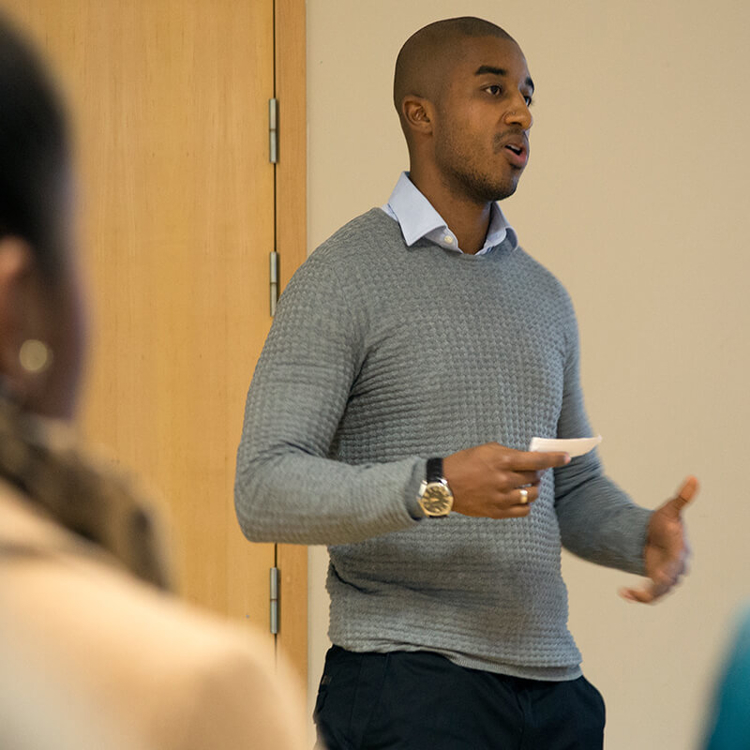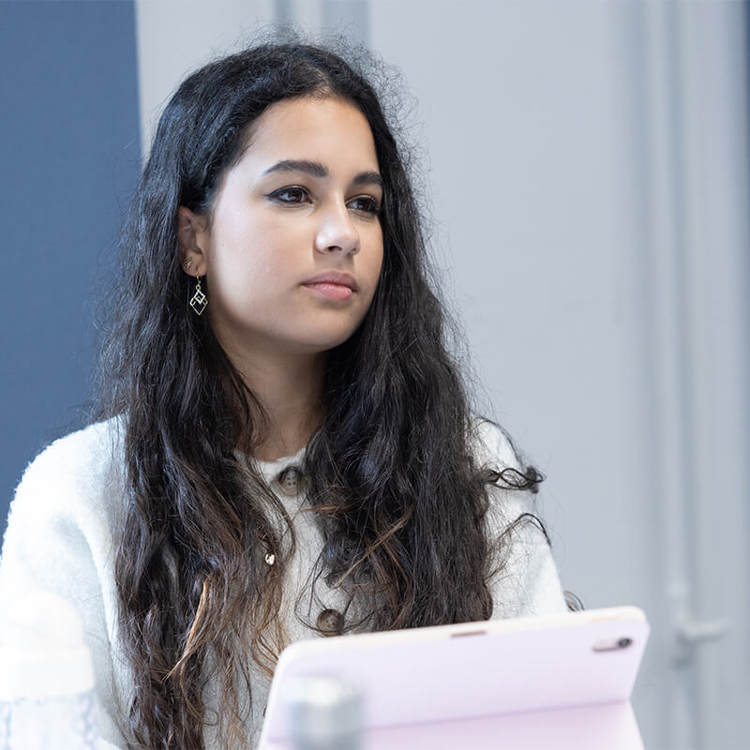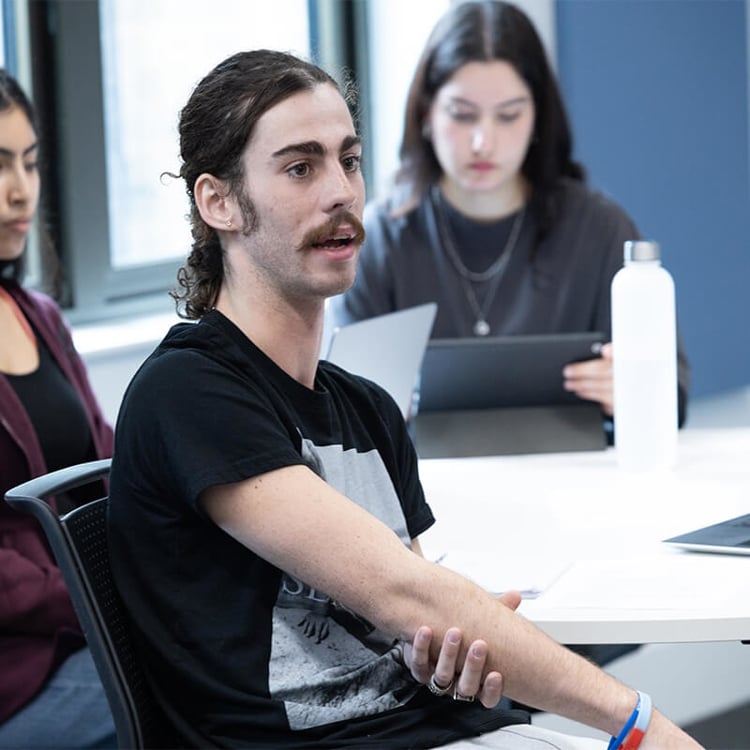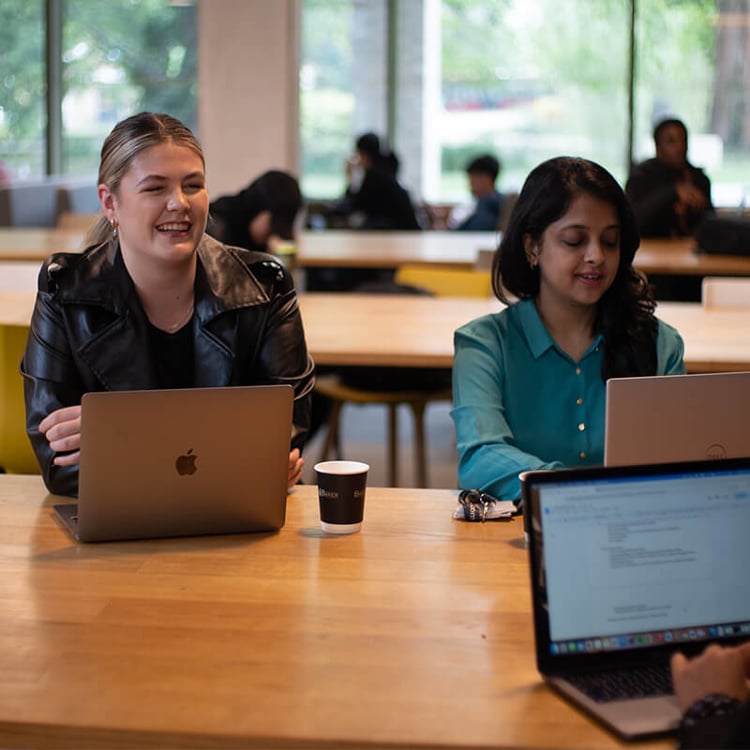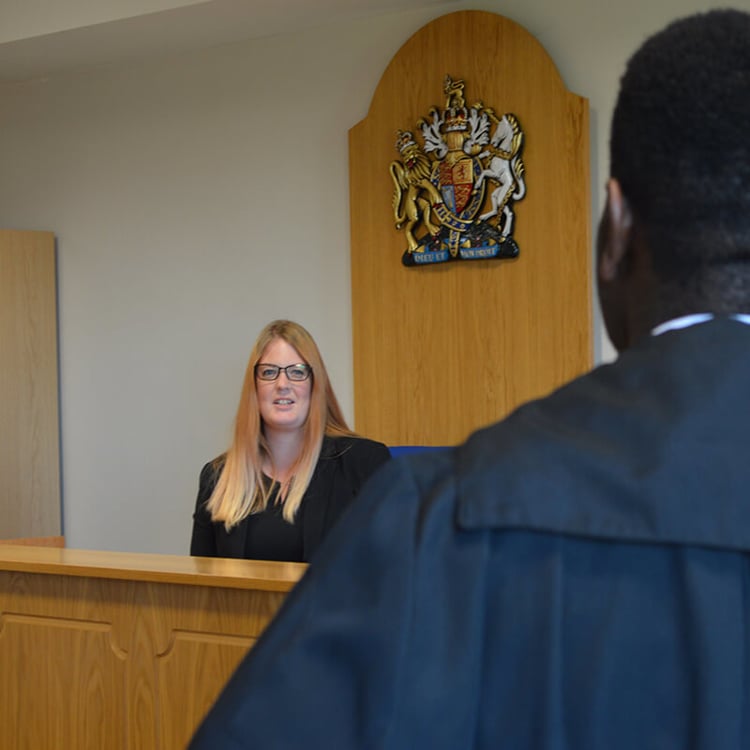Entry tariff:
240 credits
UCAS code:
N105
Start date(s):
September 2026
Our Business Management and Economics (Top-up) degree is ideal if you already have a foundation degree (FdA / FdSC), Higher National Diploma (HND), years 1 and 2 of an undergraduate degree in a relevant subject at a different institution, or equivalent qualification in a relevant subject.
You will gain the analytical skills that will help you lead, innovate, and thrive in global, digital, and data-driven business environments.
You will combine business practice with quantitative and analytical skills, which top employers are looking for in the new digital era.
On this top-up course, you will develop a skill set founded on strategic management theory that allows you to become an active participant in the strategy process that organisations deploy to ensure their long-term success. You will gain a fundamental understanding of the factual content surrounding today’s challenges and how economics can be used to highlight major global problems and aid in designing effective policies.
In the transformation capstone module, you will have the opportunity to apply your academic knowledge in a real-world setting, where you will develop strategic solutions to real-world business challenges.
Modules
30 credits
In an ever-changing world, organisations must make strategic choices based on solid analyses and decision-making processes. This module adopts an innovative teaching approach to illustrate how strategic management theories and models can be applied in different contexts and how they inform decision-making.
You will develop a skill set founded on strategic management theory that will allow you to become an active participant in the strategy process that organisations deploy to ensure their long-term success.
This module will give you a clear understanding of what strategy is all about and how organisations develop it. You will learn how to apply the essential concepts and tools of strategy that will be useful in their business career whichever sector they choose.
Main topics revolve around the strategic position of organisations, the concept of competitive advantage (how to gain competitive advantage and/or sustain it for longer), and evaluation of business strategies. After a closer look at business and corporate levels of strategy, the module ends with selected aspects of implementation.
Teaching and learning
You will be taught through lectures and workshops that involve a range of learning and teaching approaches, which includes online support and employability-related activities.
Seminars will involve critical analysis of real-life cases to address a range of strategic problems. In this way, you will develop commercial awareness and recognise drivers for business success. You will also have the opportunity to work with others and communicate your views.
Assessment
This module will be assessed through a strategic analysis report (50%) and a recommendation report (50%). Using insights from Assessment 1, you will produce a strategic options report using the relevant frameworks.
30 credits
This module applies economic analysis to current trends and key challenges in the global economy.
The topics covered include economic growth and inequality across nations, climate change, demography, health, labour, artificial intelligence, institutions and development, and the macroeconomic conditions that have emerged in the aftermath of the great recession and the COVID-19 pandemic.
By studying this module, you will gain a fundamental understanding of the factual context surrounding today's challenges and how economics can be used to both illuminate major global problems and aid in designing effective policies. Additionally, you will benefit from opportunities for group work, which will enhance your collaborative and discussion skills.
You will examine economic inequalities, labour market disparities, and institutional responses to demographic shifts. Through case studies, you will assess how policies shape opportunities and explore solutions for fostering more inclusive economic systems.
You will explore the economic impact of climate change, biodiversity loss, and environmental policies, emphasising sustainable growth strategies. You will analyse policies such as carbon taxation and green innovation, gaining insights into balancing economic development with environmental responsibility.
Teaching and learning
You will be taught through lectures and workshops that involve a range of learning and teaching approaches, which includes online support and employability-related activities.
Lectures will cover core material, and in workshops you will engage in solving practical exercises aimed at supporting and consolidating your learning.
You will be equipped with practical skills for careers in economics, policy, and finance. Through data analysis, case studies, and group projects, you will apply economic theories to real-world challenges, enhancing your analytical and problem-solving abilities.
By integrating digital tools, economic simulations, and AI-driven analysis, the module will enhance your ability to engage with complex economic data. It also explores the impact of automation and AI on labor markets and education, preparing you for a tech-driven economy.
Assessment
This module will be assessed by a group presentation (30%) and an essay (70%).
30 credits
This intensive six-week taught module is designed to equip you with the essential competencies needed for professional consultancy practice.
This module serves as the skills-based foundation for the concurrent Roehampton Live Project, providing you with theoretical frameworks, practical tools, and professional capabilities required to deliver high-quality consultancy services to real clients.
Delivered as a professional bootcamp in a blocked format, this module creates an immersive learning environment where you will develop expertise in consultancy methodologies, client relationship management, strategic problem-solving, and professional communication. The intensive structure enables you to build confidence and competence before engaging with live client projects.
You will learn to integrate ethical considerations, social responsibility, and environmental sustainability into your consultancy approach, ensuring that your professional practice contributes to broader societal wellbeing.
Key areas of focus include consultancy frameworks and methodologies, client engagement and relationship management, evidence-based research and analysis techniques, strategic thinking and recommendation development, professional communication and presentation skills, and ethical consultancy practice and sustainability integration.
You will engage in real case studies and simulated client scenarios, working individually and in teams to apply learned concepts. The module incorporates guest speakers from industry, practical workshops, and reflective exercises to bridge theory and practice effectively.
This module prepares you for immediate application of skills in your concurrent Live Project module, where you will work with real clients as part of the ‘Roehampton Business Advice Centre’.
Teaching and learning
The module employs intensive blocked delivery with high contact hours to create an immersive professional development experience. Teaching methods include interactive workshops, case study analysis, simulation exercises, guest speaker sessions, and peer learning activities.
You will have 22 hours of lectures and 33 hours of workshops over six weeks. Lectures and workshops will be interactive in nature providing an environment for sharing business ideas, problem space mapping and evaluation opportunities and carrying business scoping exercise.
Assessment
This module will be assessed through consultancy toolkit portfolio coursework (50%) and a consultancy bid presentation (50%).
30 credits
This transformative capstone module is designed to bridge the gap between academic study and professional practice. You will have the opportunity to apply your academic knowledge in a real-world setting, developing strategic solutions to real-world business challenges.
You will work in consultancy teams as part of the Roehampton Business Advice Service, collaborating with a diverse range of external clients, including small and medium enterprises (SMEs), non-profit organisations, social enterprises, and larger companies. Global engagement projects will also be sought with partners outside of the UK, or projects that can have an influence on communities globally.
Each team will engage with a client to diagnose business problems, conduct in-depth research, and formulate evidence-based recommendations. By making an impact through real-world projects, you will enhance your ability to navigate complexity, synthesise information, and communicate your insights effectively to senior stakeholders.
While teamwork is a core aspect of this module, you will also undertake substantial individual work, ensuring that your personal contributions are critically assessed and aligned with your professional aspirations. The module is structured to simulate a professional consultancy environment, equipping you with the practical skills, commercial awareness, and adaptability needed for leadership roles in business and beyond.
You will be encouraged to develop ethical, socially responsible, and sustainable business solutions, ensuring that your recommendations contribute not only to organisational success but also to broader societal and environmental wellbeing.
Through a combination of practical experience, academic rigor, and reflective work-based learning, you will be empowered to become a strategic thinker, problem solver, and an influential professional. The module is designed to be a stepping stone into a range of career paths, with projects aligned with your own career goals. By the end of this module, you will have built a portfolio of high-quality work that demonstrates your analytical, decision-making, and communication skills.
Teaching and learning
Each consultancy team will be assigned an academic supervisor who will provide structured guidance, feedback, and oversight throughout the project.
You will have scheduled supervision meetings, including meetings with your supervisor at key milestones during the project to discuss progress, challenges, and next steps. Supervisors will support you in managing client relationships and ensure professionalism in communications.
Assessment
This module will be assessed by a consultancy report (50%) and a live presentation (50%).
These are the current planned modules on this course and may be subject to change.
Careers
You’ll graduate with a set of highly marketable skills that will help you meet the many challenges in today’s rapidly changing world. You will be able to follow a wide range of career paths, thanks to your strong analytical, quantitative and problem-solving skills.
Not only will you have developed both hard-economics and soft-business transferable skills, but you will have nurtured your professional skills, which are essential for navigating today’s business environments.
You’ll have a strong foundation for a career in management, finance, consulting, policy and entrepreneurship, taking on roles such as a:
- Business, Financial, Policy or Data Analyst
- Economic Researcher
- Banking Professional
- Business Development Manager
- Entrepreneur / Start up Founder
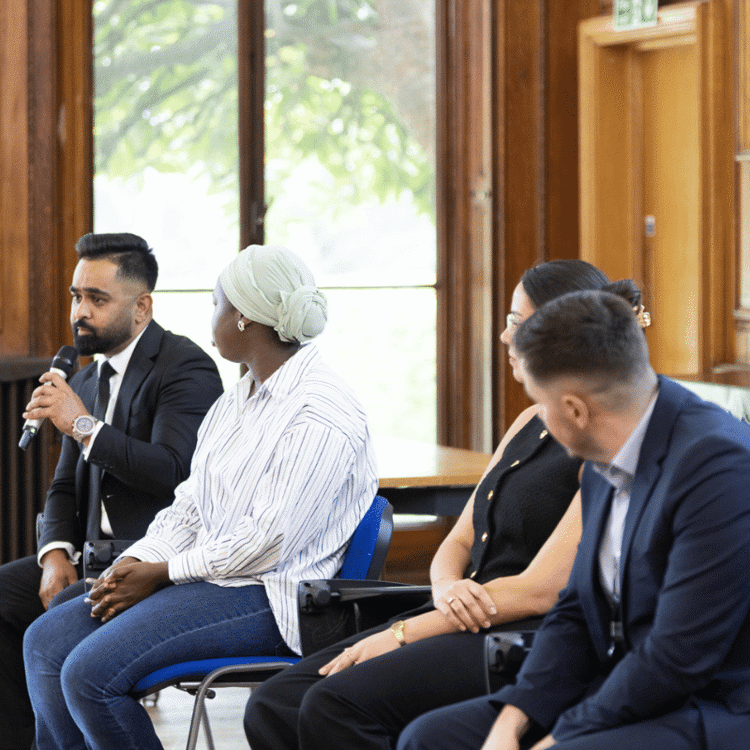
The Student Futures team is here to support you throughout your time at Roehampton and beyond.
They offer services tailored to your needs, helping you take confident steps towards your future.
You’ll have access to a wide range of career workshops and events, where you can engage with employers and develop the skills you need to succeed in the workplace.
These opportunities will help you build your CV, prepare for interviews, and connect with successful Roehampton graduates who are thriving in their careers. You’ll also be able to engage with our partners across London and beyond.
Wherever you want to go in the future, you'll be preparing for the world of work from your very first day.
Continue your studies at Roehampton
Once you've graduated, you could study one of our specialist postgraduate courses:
Learning & assessment
The course combines business knowledge acquisition with quantitative economics training.
Teaching is implemented by a coaching approach, which will cultivate your critical thinking, and collaboration and professional skills.
You will have plenty of opportunities to test your knowledge by analysing and solving realistic, real-world scenarios that reflect contemporary challenges faced by managers, business and policy makers. These cases are often based on real events, encouraging you to apply theoretical concepts to practical situations.
You will engage with live projects, simulated policy implementations, and applied research activities.
You will undertake a capstone project, where you will choose from a range of pathways from research to sustainability-focused interventions.
We will empower you to take ownership of your learning journey and develop the mindset to be a lifelong learner. We will facilitate your learning through reflective questioning, structured, personalised feedback, and mentoring that will enhance your personal growth and academic independence.
You’ll gain key skills in resilience, adaptability and professional self-awareness and put yourself in a confidence place for future study or employment.
In every module, you will learn technical quantitative skills that are then applied in real-world business cases, live projects, and reflective practices.
Teaching integrates lectures, solving abstract problem sets and engaging in practical workshops and case studies. These activities take place in state-of-the-art facilities, including our Bloomberg Trading Room, and make use of relevant software packages, like Stata and SPSS.
This blend promotes critical, active and applied learning that will prepare you for new digital and global business environments.
How you'll be assessed
Assessments are authentic, industry-relevant, enabling you to apply your knowledge to a wide variety of assessments alongside formal tests and exams.
These include:
- Data analysis
- Critical use of Artificial Intelligence
- Theoretical problem sets
- Posters and presentations
- Business projects creation and management
- Business consultancy projects
- Reflective reports on business management decisions
Opportunities & facilities
At Roehampton, you will become part of a values-led, globally conscious academic community where innovation, sustainability, and inclusive leadership are central to how we teach, learn and build the future.

Bloomberg Trading Room
You'll have access to the same powerful tools that professionals use to analyse real-time finance and economics data, stay ahead of the curve with the latest insights, and build the skills that will set you apart in the competitive finance industry.
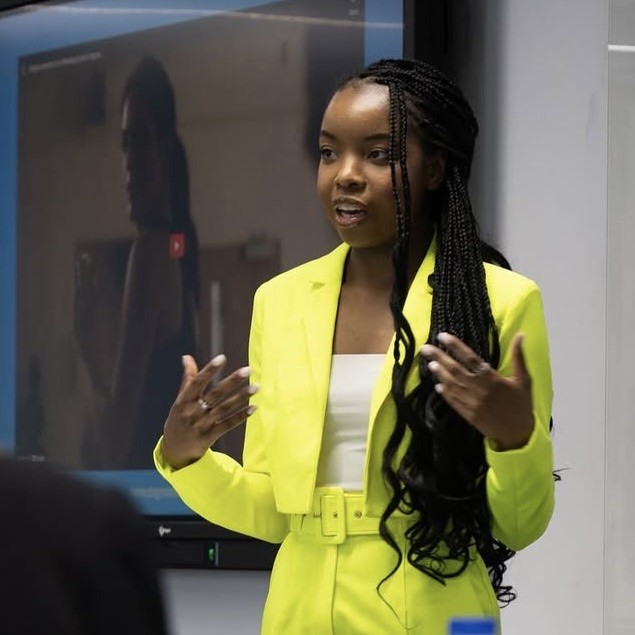
Roehampton Business Laboratory
Our enterprise incubator will support you in developing and scaling entrepreneurial ideas. It also houses signature initiatives like the RISE Prize and the Dragon's Den Style Launchpad showcase.
Celebrating innovation at the LaunchPad start-up awards 2025

World-class library
Home to hundreds of thousands of books, over 1,000 seats, and modern, collaborative and silent study spaces. You'll also have access to a vast range of online resources, like e-books, journals, and databases whenever you want.
Open days
Get a real taste of our campus, community and what it’s like to study at Roehampton
Applying
Full-time UK undergraduate students apply through UCAS.
Entry tariff
Looking to work out your UCAS points or find out about our entry requirements? Find out more.
When we consider applications to study with us, we form a complete view of your achievements to date, and future potential, and can offer flexibility in entry requirements. Find out more about our Contextual Offer scheme.
Specific entry requirements
- 240 credits from a Higher National Diploma (HND), a foundation degree (FdA/ FdSc) or equivalent international qualification in a relevant subject.
- 240 credits from years 1 and 2 of an undergraduate degree (BA/BSc) in a relevant subject at a different institution.
General entry requirements
International undergraduate students apply through our direct application system.
Entry tariff
Looking to work out your UCAS points or find out about our entry requirements? Find out more.
When we consider applications to study with us, we form a complete view of your achievements to date, and future potential, and can offer flexibility in entry requirements. Find out more about our Contextual Offer scheme.
Specific entry requirements
- 240 credits from a Higher National Diploma (HND), a foundation degree (FdA/ FdSc) or equivalent international qualification in a relevant subject.
- 240 credits from years 1 and 2 of an undergraduate degree (BA/BSc) in a relevant subject at a different institution.
General entry requirements
Fees and funding
UK students
Tuition fees
| Entry date | Undergraduate Year 1 |
|---|---|
| September 2026 | £9,790 |
Prices shown are for the first year of your degree.
Funding your studies
We also provide other ways to support the cost of living, including on-campus car parking, hardship support and some of the most affordable student accommodation and catering in London.
International students
Tuition fees
| Entry date | Undergraduate Year 1 |
|---|---|
| September 2026 | £17,628 |
Prices shown are for the first year of your degree.
Funding your studies
We also provide other ways to support the cost of living, including on-campus car parking, hardship support and some of the most affordable student accommodation and catering in London.


